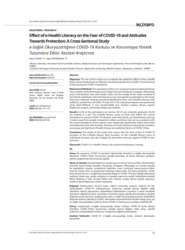Effect of e-Health Literacy on the Fear of COVID-19 and Attitudes Towards Protection: A Cross-Sectional Study
-
Tür
Makale
- Yayın Tarihi 2023
-
Yayıncı
İzmir Kâtip Çelebi Üniversitesi Sağlık Bilimleri Fakültesi
- Dergi Adı İzmir Kâtip Çelebi Üniversitesi Sağlık Bilimleri Fakültesi Dergisi 8, ( 1 ), pp.53 - 59
- Tek Biçim Adres https://hdl.handle.net/11469/3636
-
Konu Başlıkları
COVID-19
e-Health Literacy
Fear
Protective behaviour
Nursing
e-Sağlık okuryazarlığı
Korku
Önleyici davranışlar
Hemşirelik
Objective: The aim of this study was to evaluate the predictive effect of the e-Health literacy level of individuals on attitudes towards protection from COVID-19 and the level of fear during the COVID-19 pandemic.
Material and Method: The population of this cross-sectional study included individuals who could be reached through social media channels (Facebook, Instagram, WhatsApp) and e-mail between July and October 2020, and the sample of the study consisted of 522 literate individuals who had internet access and agreed to participate in the study. Data were collected using the personal identification form, the e-Health Literacy Scale (eHEALS), and the Fear of COVID-19 Scale (FCV-19S). Statistical analyses were performed using Mann-Whitney U test, Kruskal-Wallis test, Posthoc analysis, Binary Logistic Regression analysis, and Simple Regression Analysis.
Results: 53.4% of the participants are women, 89.5% are university graduates, 60.3% are working in a job. The e-health literacy scores of those who follow the current information to prevent COVID-19 infection, wash their hands, use disinfectants, and stay 2 meters away from people compared to others, and those who act in accordance with the recommendations of the experts, were statistically significantly higher than those who behaved in line with the bans. Presence of chronic disease among family members, young age and high level of health literacy are predictive factors of COVID-19 fear.
Conclusion: The results of this study have shown that the level of fear of COVID-19 increases as the e-Health literacy level increases. As the e-Health literacy score of individuals increases, the rate of apply the preventive measures against COVID-19 also increases.
-
Koleksiyonlar
FAKÜLTELER
SAĞLIK BİLİMLERİ FAKÜLTESİ

 Tam Metin
Tam Metin

